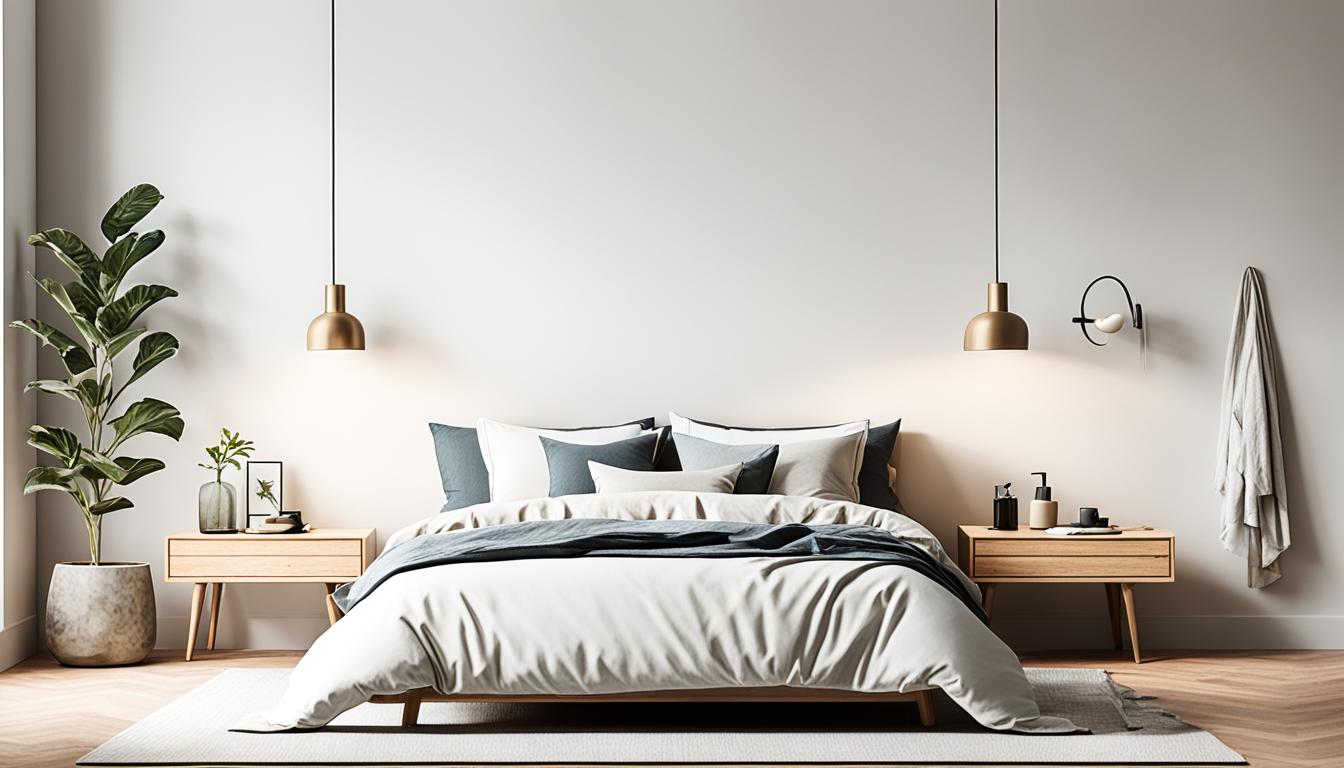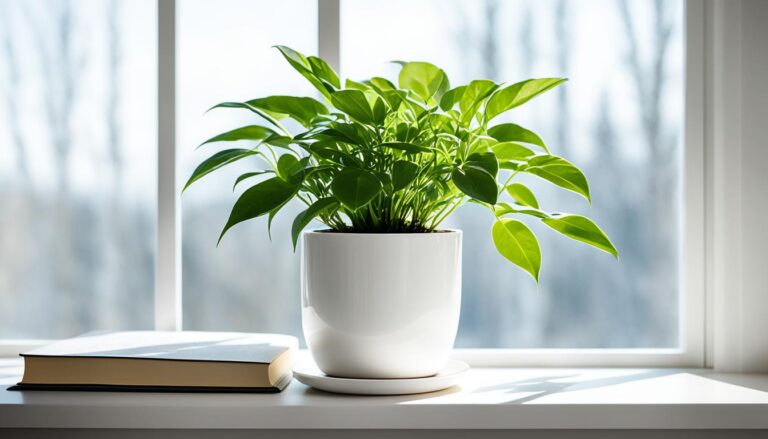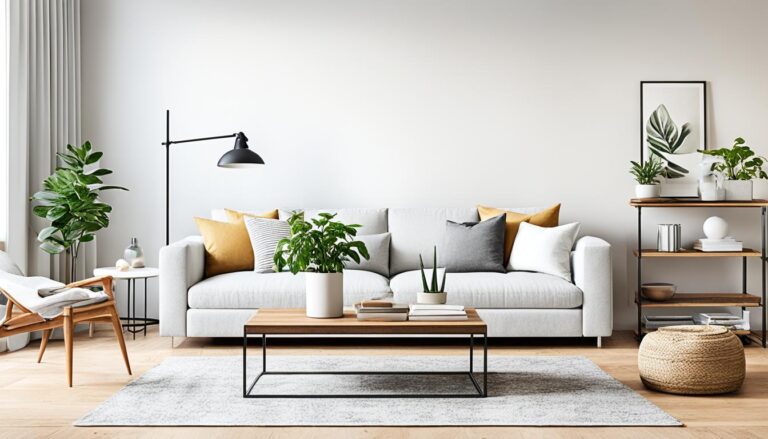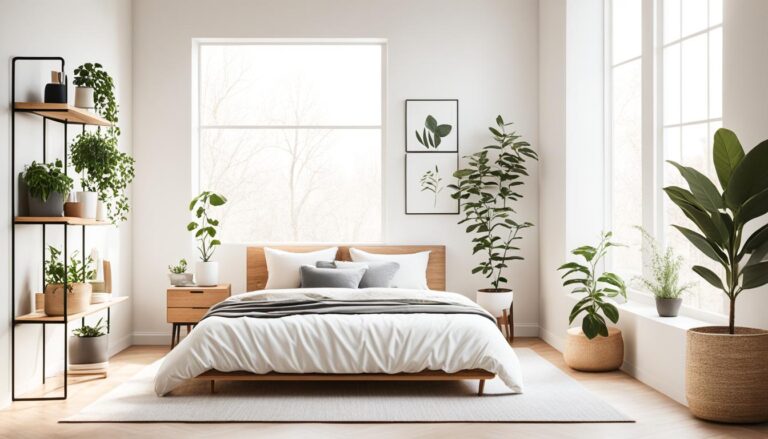Minimalism fights against the world’s excess. It’s the opposite of what ads tell us. Our society loves buying more and more stuff. We’re surrounded by consumerism, clutter, and distractions. But, we often lose what truly matters.
By living minimally, you can focus on what’s really important. It means letting go of the unnecessary. This way, you can find peace and purpose.
Living with less has many benefits. You’ll have less to clean and less stress. Your home will be tidy, and you’ll save money. But there’s more to it. Minimalism can change your life deeply.
Key Takeaways
- Minimalism leads to a reduction in possessions.
- Minimalist lifestyle results in financial freedom and increased savings.
- Possessing fewer items leads to easier cleaning and simplified household chores.
- Minimalism contributes to greater happiness and life satisfaction.
- Pursuing minimalism provides a sense of independence and freedom.
Less Stress and Clutter
Having fewer possessions can really help reduce stress and anxiety. Studies show a strong link between clutter and stress hormones like cortisol. Women with messy homes often had higher cortisol levels by the end of the day.
Minimizing Possessions Reduces Anxiety
High cortisol levels can lead to many health issues, like anxiety and depression. Minimalism can greatly improve mental health by reducing stress and anxiety. It helps keep cortisol levels in check.
“Minimalism can have substantial mental health benefits by reducing feelings of stress and anxiety and helping keep cortisol levels balanced.”
Research from the Journal of Neuroscience found that too much clutter can make your brain work harder and lower productivity. Minimalists focus on what truly matters in life. This leads to a happier and less anxious life.
Embracing minimalism can make you more efficient and clear-headed. It helps reduce both physical and mental clutter. By keeping only what’s truly needed, minimalists live a less stressful and happier life.
Increased Productivity and Focus
Living a minimalist life can greatly improve your productivity and focus. Our brains do well in tidy spaces. Too many reminders of mess can make us tired and less able to concentrate.
Research shows that too many objects in sight make our brains work harder. This can lead to feeling tired and less productive over time. But, cleaning up your home and work spaces can make you more productive and focused.
- Decluttering your workspace can lead to a 1.5-times increase in the ability to perform challenging tasks, according to research by Harvard.
- Multitasking can reduce productivity by up to 40%, particularly for complex or unfamiliar tasks, as various studies have shown.
- Minimalist workspaces with fewer distracting objects present have been linked to improved focus and reduced distractions.
Minimalism helps you focus on what’s really important. It makes you more productive and lets you do more in less time. A clean space and focusing on one task at a time can help you manage your time and thoughts better. This leads to better focus, clarity, and work performance.
“Minimalism is the intentional promotion of the things we most value and the removal of everything that distracts us from it.” – Joshua Becker
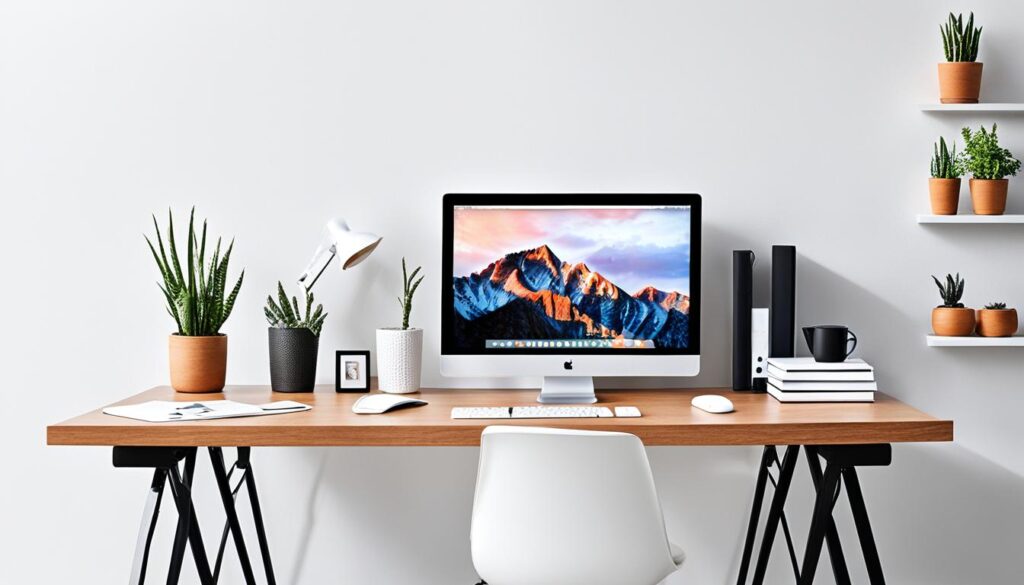
In today’s world, with so many distractions and the urge to do many things at once, minimalism can help you get back your productivity and focus. By cleaning up your space and simplifying your digital life, you can make a place that helps you concentrate better, make smarter choices, and reach your goals faster.
minimalist lifestyle Saves Money
Today, with costs for goods, housing, and heating at record highs, a minimalist lifestyle is more appealing. In the U.S., nearly half of Americans feel their homes are too full of things they don’t need or use. One in seven Americans even has a room they can’t use because of clutter. This shows how having too many items can be a big financial problem.
Living a minimalist life can lead to big savings. By buying less and being happy with what you have, you can cut down on spending. Selling items you don’t use can also bring in extra money. Research shows many Americans have over $1,000 worth of unused items at home, but only 19% plan to sell them.
| Minimalist Lifestyle Benefits | Potential Savings |
|---|---|
| Reduced spending on goods and housing | Over 50% of income can be saved |
| Selling unused items | Average of $1,000+ in potential earnings |
| Decreased utility and maintenance costs | Significant monthly savings |
| Simplified meal planning and cooking at home | Reduced food waste and dining expenses |
| Cutting back on subscriptions and memberships | Hundreds of dollars saved annually |
Living a minimalist life brings many financial benefits. It leads to less spending, less clutter, and more money from selling items you don’t use. This way of living not only helps with financial savings and reduced spending. It also helps with decluttering and selling of unused items. All these benefits make for a more sustainable and fulfilling life.
“Minimalism is the intentional promotion of the things we most value and the removal of everything that distracts us from it.” – Joshua Becker
Less Cleaning and Tidying
Fewer Belongings Means Less Housework
Living a minimalist life can cut down the time you spend cleaning and organizing. With fewer things, there’s less to clean and take care of. Studies say decluttering can cut housework by up to 40% in most homes.
Having fewer clothes means less laundry. Clearing kitchen counters of things you don’t need makes cleaning faster. Decluttering kids’ toys regularly helps keep things clean and tidy. Hiring a yard service makes looking after a big yard easier, keeping it nice without the hassle.
Putting all cleaning supplies in one spot and getting everyone to help with cleaning makes things easier. Breaking tasks into smaller parts and cleaning daily can greatly reduce the time needed to keep your home clean.
“Keeping an uncluttered room can significantly reduce cleaning time, doubling or tripling it if there is a lot of stuff in the room.”
Choosing a minimalist way of life changes how you see cleaning and organizing. The less you own, the less you have to clean and maintain. This frees up time and energy for things you enjoy more.
Greater Happiness and Life Satisfaction
Living a minimalist life can make you happier and more satisfied with life. Many people focus too much on stuff, which can make them unhappy. But, spending on experiences, like trips or movies, can make you feel better than buying things.
Minimalism helps you live a happier, more meaningful life by boosting your well-being. Studies show that minimalists are happier and more fulfilled than those who don’t simplify their lives. By valuing experiences over stuff, minimalists find more joy and contentment.
“Minimalism allows individuals to focus on their priorities, enhancing productivity and well-being due to fewer distractions.”
With less focus on stuff and more on experiences and relationships, you feel happier and more satisfied. Minimalism helps you see what’s truly important in life. This means you value experiences and relationships more than material goods.
Minimalism also leads to a greener lifestyle, which is good for your well-being. With less buying, there’s less pollution and waste. This is good for the planet and makes you feel more purposeful and satisfied.
By choosing a minimalist life, you can find more happiness and life satisfaction. This leads to a more fulfilling and meaningful life.
More Free Space and Better Organization
Living a minimalist life can make your living spaces more usable and organized. Today’s average American home is twice as big as those from the 1950s. Yet, three out of four garages are so full, there’s no room for a car. By getting rid of things you don’t need, you can make your home work better for you. This creates a peaceful and useful space that meets your needs.
Uncluttered Spaces Provide Usable Living Areas
Removing clutter from your spaces brings more freedom and calm. Without all the stuff, your rooms feel bigger and more welcoming. This lets you use your space better. It makes your home look nicer and helps you think clearer and feel better.
Minimalism helps you find hidden storage spots, like using shelves and racks. By choosing what you keep, you make your space look good and feel bigger. This means you can focus better on what you’re doing.
“A cluttered space can lead to a cluttered mind. Minimalism empowers us to live more intentionally, with greater focus and serenity.”
In a minimalist home, every item should have a purpose or make you happy. This means choosing quality items that do more in your space. This way, your home looks good and works well, letting you enjoy it more.
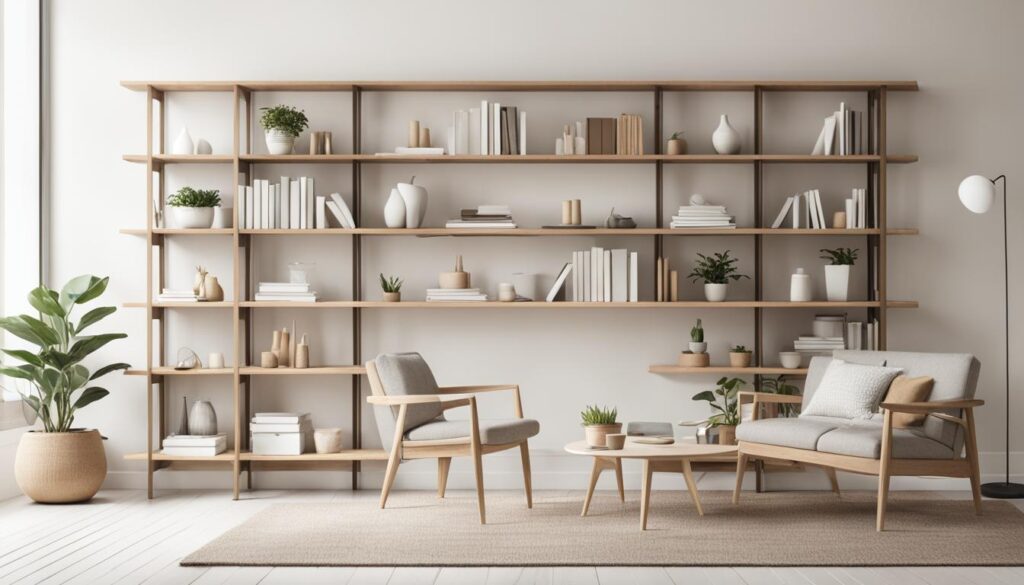
Minimalism does more than just tidy up your home. It brings you freedom, calm, and more productivity. This lets you live a happier and more balanced life.
Reduced Environmental Impact
The use of consumerism is harming the planet and causing climate change. A 2015 study showed that making and using household items created 60 percent of global greenhouse gas emissions. By living a minimalist lifestyle, we can greatly lessen our environmental impact.
Minimalism means buying less and recycling more. This helps us use fewer natural resources and make less waste. It’s all about being sustainable, which is key to solving today’s environmental problems.
Living minimally changes many parts of our lives. Smaller homes use less energy, and owning fewer cars cuts down on greenhouse gas emissions. Eating and wearing less also helps the environment, as making these items harms nature.
“The minimalist lifestyle focuses on consuming less and making sustainable choices, which can have a profound impact on the environment.”
Choosing a minimalist life helps us and the planet. It means less waste, recycling, and supporting green businesses. The minimalist lifestyle leads to a greener future.
In conclusion, our choices affect the planet a lot. Living minimally makes a big difference in cutting down our carbon footprint and supporting sustainability. It’s good for the earth and makes life better and less stressful.
Conclusion
Living a minimalist lifestyle can change lives in big ways. It’s about keeping things simple and focusing on what’s important. This approach can lead to less stress, more productivity, saving money, and helping the environment.
Many Americans keep buying more stuff, but a minimalist lifestyle offers a better path. It frees you from always wanting more. By decluttering, changing how you spend, and valuing experiences over things, you gain happiness and personal growth.
Choosing a minimalist lifestyle is a personal decision, but the benefits are clear. This article has shown how minimalism can change your life for the better. It’s time to think about how minimalism could make a difference in your life too.

